Corporate Governance Report: Shareholder vs Stakeholder Interests
VerifiedAdded on 2023/06/08
|10
|2514
|248
Report
AI Summary
This report delves into the complexities of corporate governance, examining the core objectives of companies and the roles of directors in balancing shareholder and stakeholder interests. It begins by defining a company's purpose and then explores the legal framework, including the Corporations Act 2001 (Cth), and the duties of directors. The report evaluates the debate on whether directors should prioritize shareholder interests or consider stakeholders. The report examines the theory of Corporate Social Responsibility (CSR) and its benefits, contrasting it with Milton Friedman's narrow view of CSR. It concludes by highlighting good governance principles, the significance of CSR, and the legal requirements for directors to consider shareholder interests. The report also offers recommendations based on the analysis of the evidence.
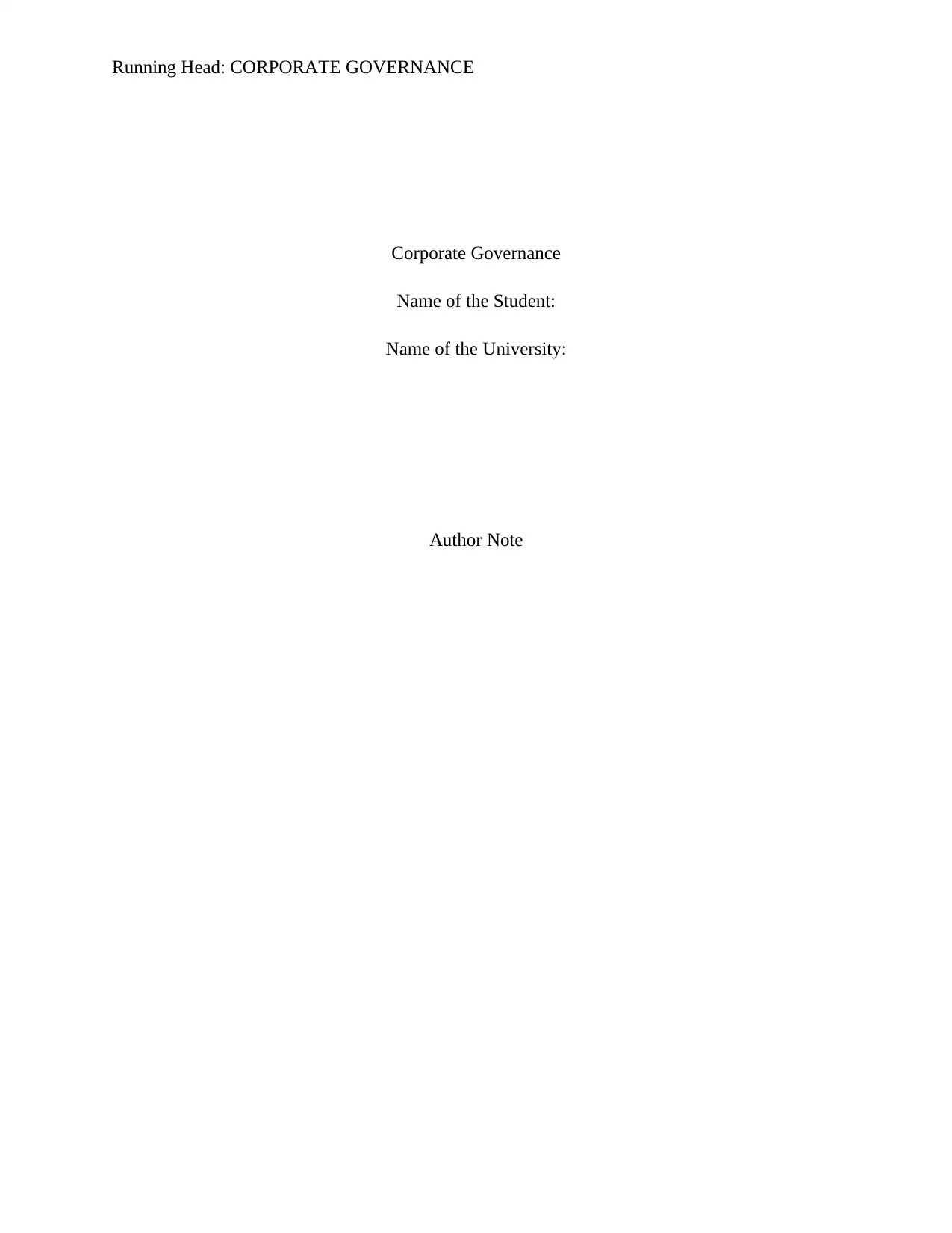
Running Head: CORPORATE GOVERNANCE
Corporate Governance
Name of the Student:
Name of the University:
Author Note
Corporate Governance
Name of the Student:
Name of the University:
Author Note
Paraphrase This Document
Need a fresh take? Get an instant paraphrase of this document with our AI Paraphraser
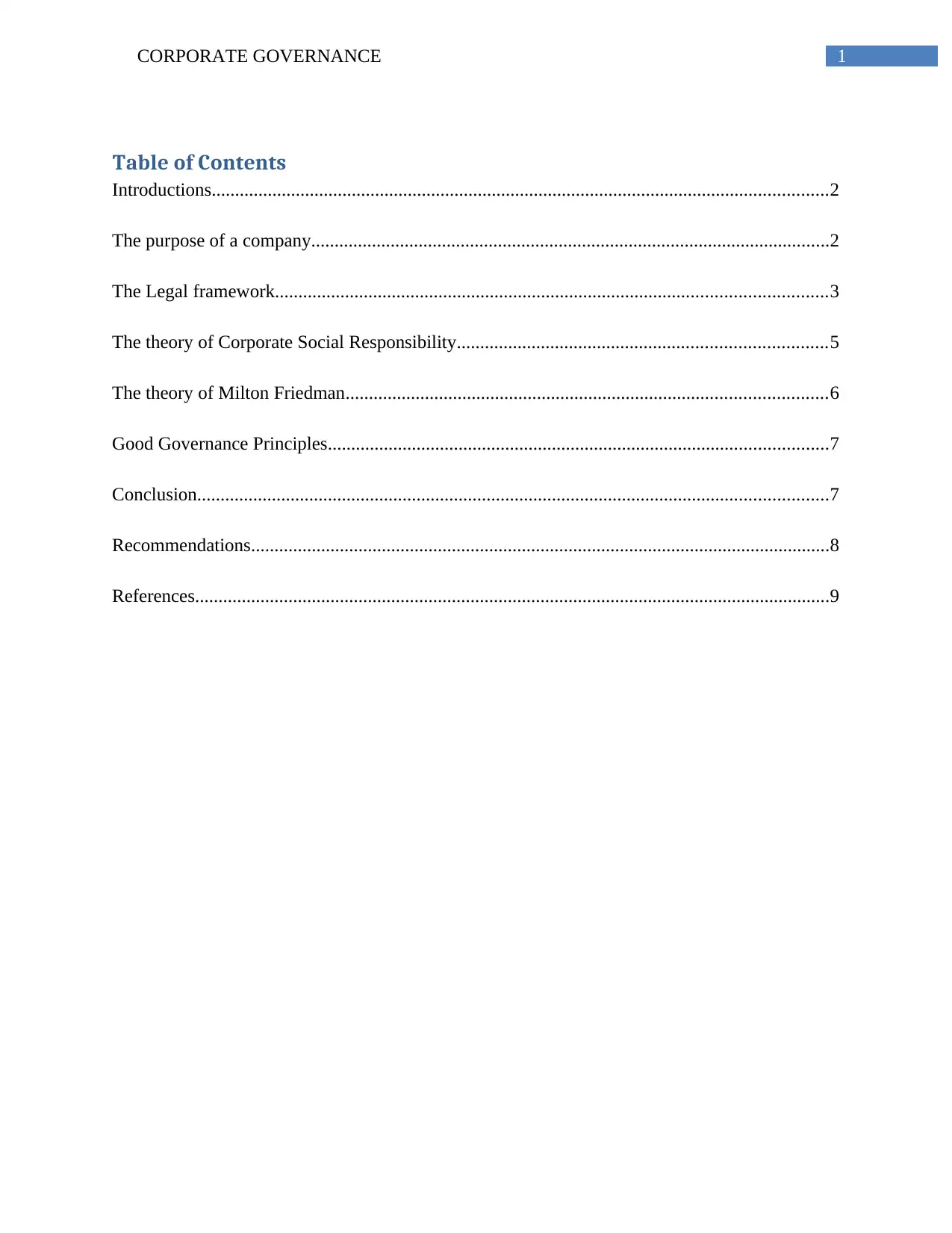
1CORPORATE GOVERNANCE
Table of Contents
Introductions....................................................................................................................................2
The purpose of a company...............................................................................................................2
The Legal framework......................................................................................................................3
The theory of Corporate Social Responsibility...............................................................................5
The theory of Milton Friedman.......................................................................................................6
Good Governance Principles...........................................................................................................7
Conclusion.......................................................................................................................................7
Recommendations............................................................................................................................8
References........................................................................................................................................9
Table of Contents
Introductions....................................................................................................................................2
The purpose of a company...............................................................................................................2
The Legal framework......................................................................................................................3
The theory of Corporate Social Responsibility...............................................................................5
The theory of Milton Friedman.......................................................................................................6
Good Governance Principles...........................................................................................................7
Conclusion.......................................................................................................................................7
Recommendations............................................................................................................................8
References........................................................................................................................................9
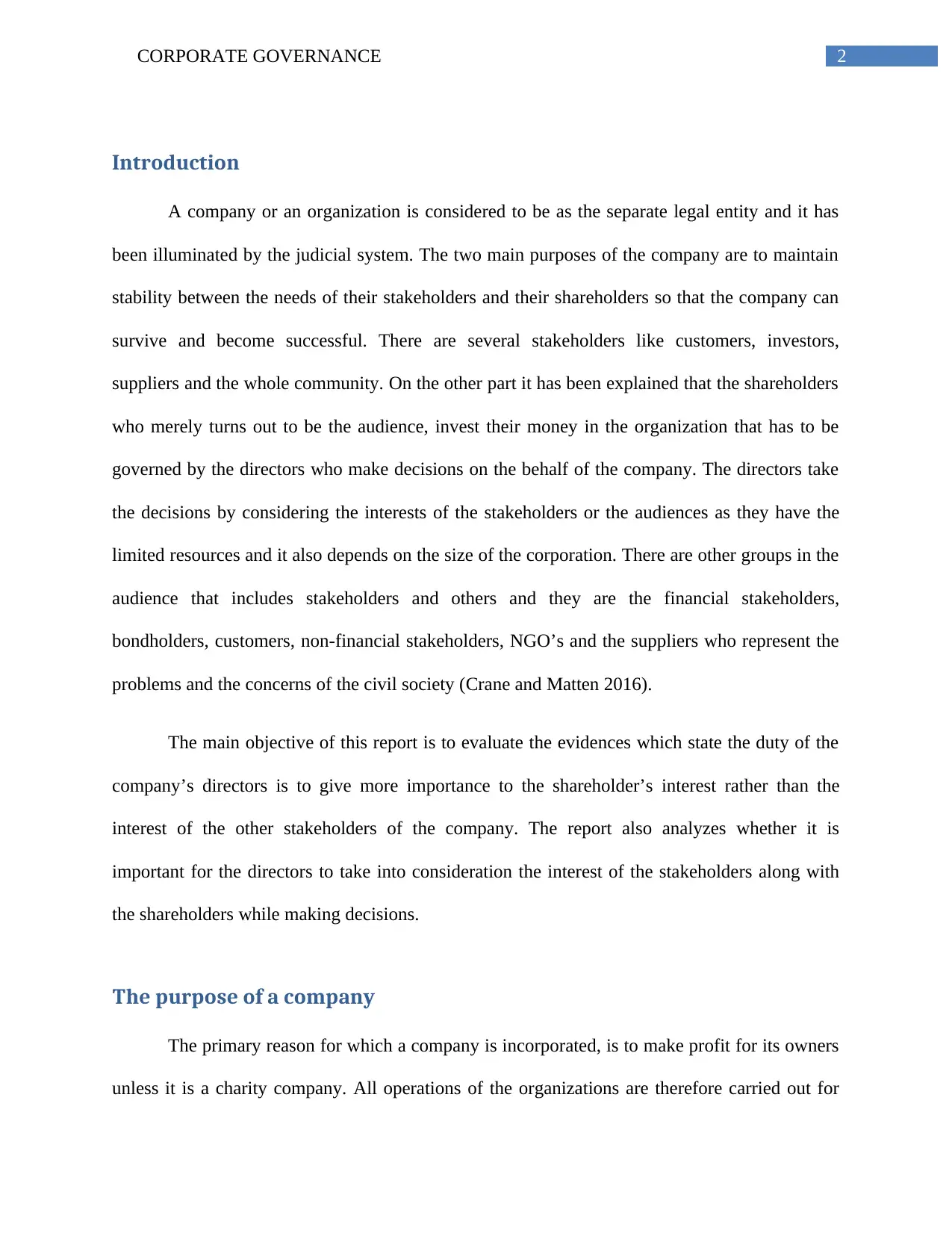
2CORPORATE GOVERNANCE
Introduction
A company or an organization is considered to be as the separate legal entity and it has
been illuminated by the judicial system. The two main purposes of the company are to maintain
stability between the needs of their stakeholders and their shareholders so that the company can
survive and become successful. There are several stakeholders like customers, investors,
suppliers and the whole community. On the other part it has been explained that the shareholders
who merely turns out to be the audience, invest their money in the organization that has to be
governed by the directors who make decisions on the behalf of the company. The directors take
the decisions by considering the interests of the stakeholders or the audiences as they have the
limited resources and it also depends on the size of the corporation. There are other groups in the
audience that includes stakeholders and others and they are the financial stakeholders,
bondholders, customers, non-financial stakeholders, NGO’s and the suppliers who represent the
problems and the concerns of the civil society (Crane and Matten 2016).
The main objective of this report is to evaluate the evidences which state the duty of the
company’s directors is to give more importance to the shareholder’s interest rather than the
interest of the other stakeholders of the company. The report also analyzes whether it is
important for the directors to take into consideration the interest of the stakeholders along with
the shareholders while making decisions.
The purpose of a company
The primary reason for which a company is incorporated, is to make profit for its owners
unless it is a charity company. All operations of the organizations are therefore carried out for
Introduction
A company or an organization is considered to be as the separate legal entity and it has
been illuminated by the judicial system. The two main purposes of the company are to maintain
stability between the needs of their stakeholders and their shareholders so that the company can
survive and become successful. There are several stakeholders like customers, investors,
suppliers and the whole community. On the other part it has been explained that the shareholders
who merely turns out to be the audience, invest their money in the organization that has to be
governed by the directors who make decisions on the behalf of the company. The directors take
the decisions by considering the interests of the stakeholders or the audiences as they have the
limited resources and it also depends on the size of the corporation. There are other groups in the
audience that includes stakeholders and others and they are the financial stakeholders,
bondholders, customers, non-financial stakeholders, NGO’s and the suppliers who represent the
problems and the concerns of the civil society (Crane and Matten 2016).
The main objective of this report is to evaluate the evidences which state the duty of the
company’s directors is to give more importance to the shareholder’s interest rather than the
interest of the other stakeholders of the company. The report also analyzes whether it is
important for the directors to take into consideration the interest of the stakeholders along with
the shareholders while making decisions.
The purpose of a company
The primary reason for which a company is incorporated, is to make profit for its owners
unless it is a charity company. All operations of the organizations are therefore carried out for
⊘ This is a preview!⊘
Do you want full access?
Subscribe today to unlock all pages.

Trusted by 1+ million students worldwide
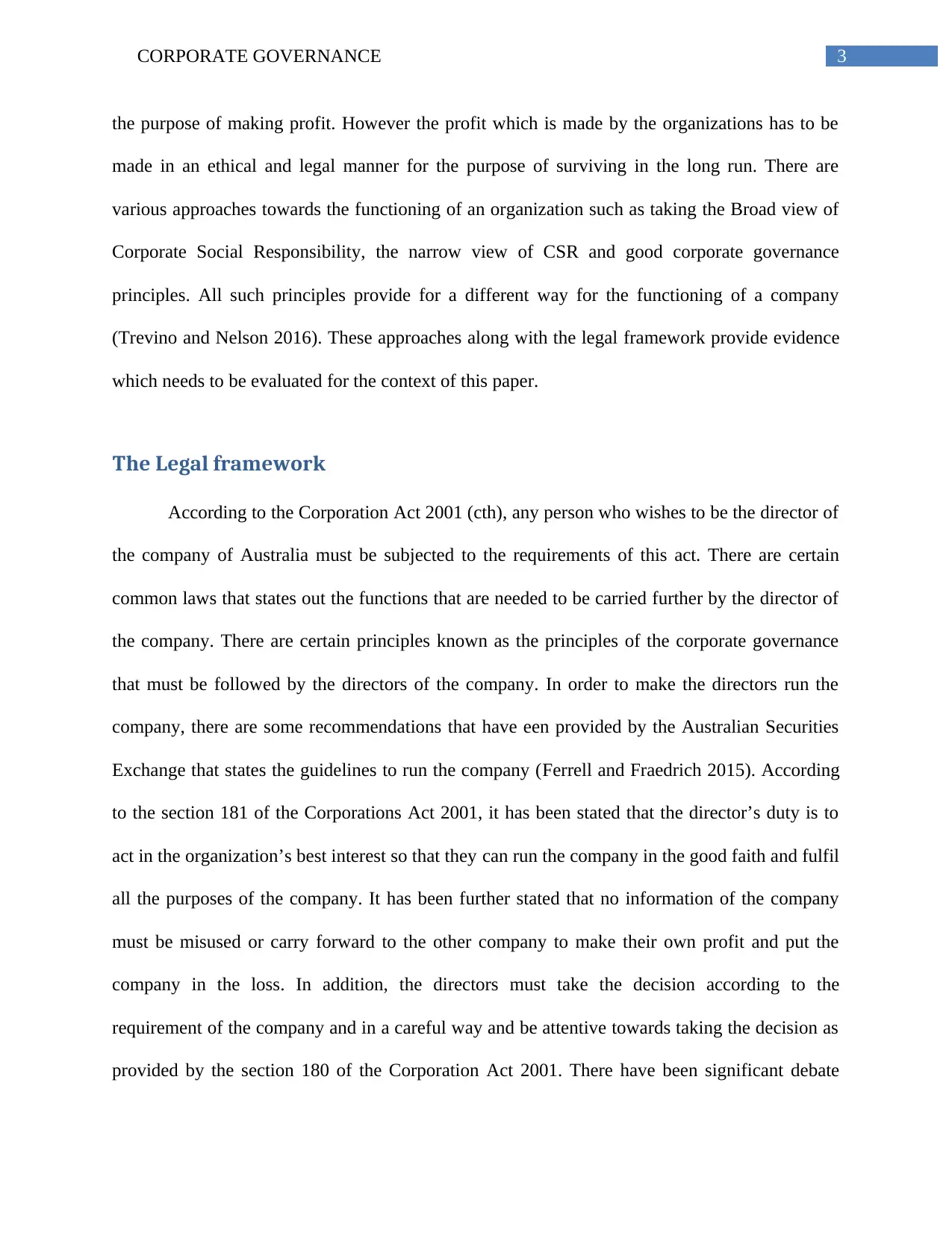
3CORPORATE GOVERNANCE
the purpose of making profit. However the profit which is made by the organizations has to be
made in an ethical and legal manner for the purpose of surviving in the long run. There are
various approaches towards the functioning of an organization such as taking the Broad view of
Corporate Social Responsibility, the narrow view of CSR and good corporate governance
principles. All such principles provide for a different way for the functioning of a company
(Trevino and Nelson 2016). These approaches along with the legal framework provide evidence
which needs to be evaluated for the context of this paper.
The Legal framework
According to the Corporation Act 2001 (cth), any person who wishes to be the director of
the company of Australia must be subjected to the requirements of this act. There are certain
common laws that states out the functions that are needed to be carried further by the director of
the company. There are certain principles known as the principles of the corporate governance
that must be followed by the directors of the company. In order to make the directors run the
company, there are some recommendations that have een provided by the Australian Securities
Exchange that states the guidelines to run the company (Ferrell and Fraedrich 2015). According
to the section 181 of the Corporations Act 2001, it has been stated that the director’s duty is to
act in the organization’s best interest so that they can run the company in the good faith and fulfil
all the purposes of the company. It has been further stated that no information of the company
must be misused or carry forward to the other company to make their own profit and put the
company in the loss. In addition, the directors must take the decision according to the
requirement of the company and in a careful way and be attentive towards taking the decision as
provided by the section 180 of the Corporation Act 2001. There have been significant debate
the purpose of making profit. However the profit which is made by the organizations has to be
made in an ethical and legal manner for the purpose of surviving in the long run. There are
various approaches towards the functioning of an organization such as taking the Broad view of
Corporate Social Responsibility, the narrow view of CSR and good corporate governance
principles. All such principles provide for a different way for the functioning of a company
(Trevino and Nelson 2016). These approaches along with the legal framework provide evidence
which needs to be evaluated for the context of this paper.
The Legal framework
According to the Corporation Act 2001 (cth), any person who wishes to be the director of
the company of Australia must be subjected to the requirements of this act. There are certain
common laws that states out the functions that are needed to be carried further by the director of
the company. There are certain principles known as the principles of the corporate governance
that must be followed by the directors of the company. In order to make the directors run the
company, there are some recommendations that have een provided by the Australian Securities
Exchange that states the guidelines to run the company (Ferrell and Fraedrich 2015). According
to the section 181 of the Corporations Act 2001, it has been stated that the director’s duty is to
act in the organization’s best interest so that they can run the company in the good faith and fulfil
all the purposes of the company. It has been further stated that no information of the company
must be misused or carry forward to the other company to make their own profit and put the
company in the loss. In addition, the directors must take the decision according to the
requirement of the company and in a careful way and be attentive towards taking the decision as
provided by the section 180 of the Corporation Act 2001. There have been significant debate
Paraphrase This Document
Need a fresh take? Get an instant paraphrase of this document with our AI Paraphraser
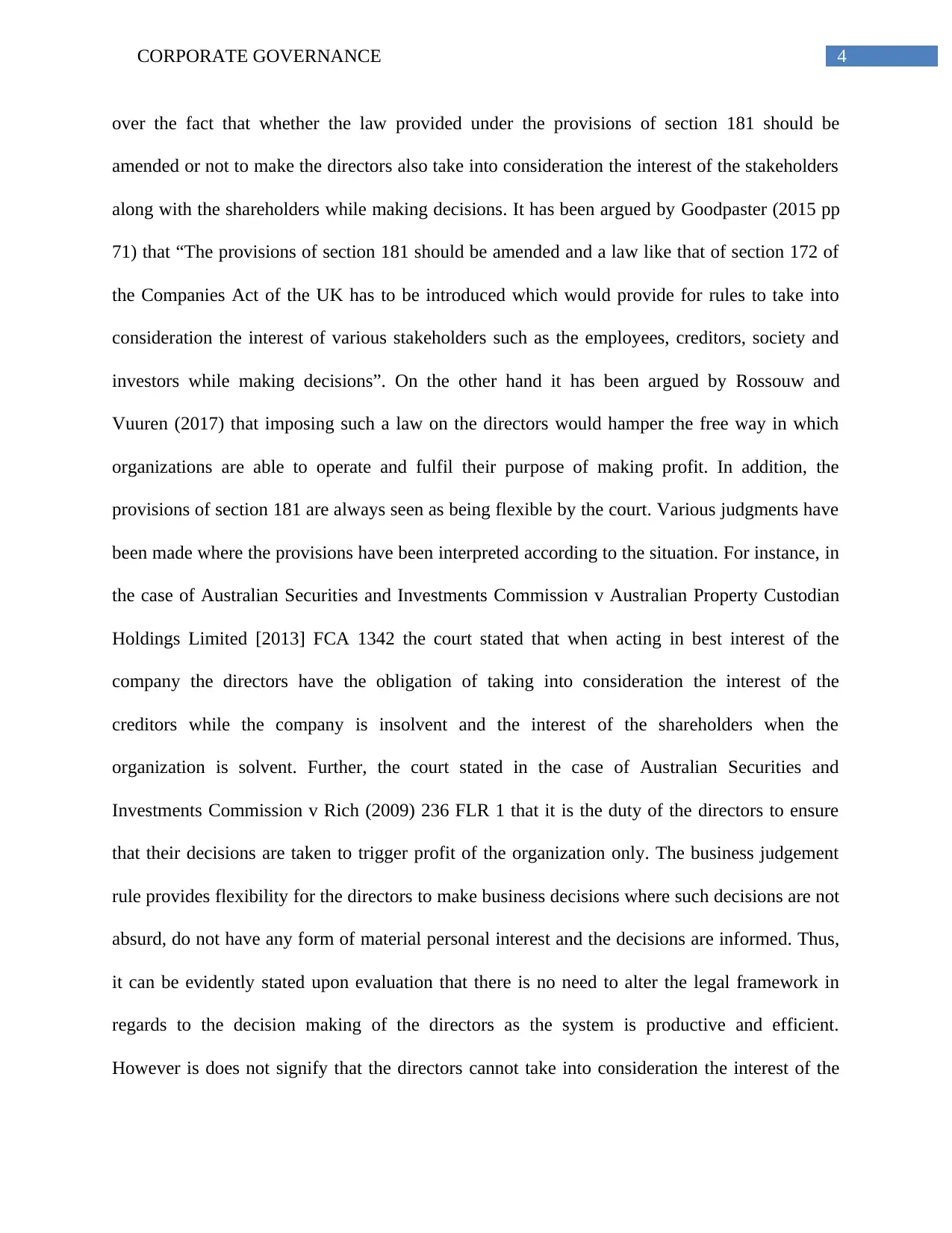
4CORPORATE GOVERNANCE
over the fact that whether the law provided under the provisions of section 181 should be
amended or not to make the directors also take into consideration the interest of the stakeholders
along with the shareholders while making decisions. It has been argued by Goodpaster (2015 pp
71) that “The provisions of section 181 should be amended and a law like that of section 172 of
the Companies Act of the UK has to be introduced which would provide for rules to take into
consideration the interest of various stakeholders such as the employees, creditors, society and
investors while making decisions”. On the other hand it has been argued by Rossouw and
Vuuren (2017) that imposing such a law on the directors would hamper the free way in which
organizations are able to operate and fulfil their purpose of making profit. In addition, the
provisions of section 181 are always seen as being flexible by the court. Various judgments have
been made where the provisions have been interpreted according to the situation. For instance, in
the case of Australian Securities and Investments Commission v Australian Property Custodian
Holdings Limited [2013] FCA 1342 the court stated that when acting in best interest of the
company the directors have the obligation of taking into consideration the interest of the
creditors while the company is insolvent and the interest of the shareholders when the
organization is solvent. Further, the court stated in the case of Australian Securities and
Investments Commission v Rich (2009) 236 FLR 1 that it is the duty of the directors to ensure
that their decisions are taken to trigger profit of the organization only. The business judgement
rule provides flexibility for the directors to make business decisions where such decisions are not
absurd, do not have any form of material personal interest and the decisions are informed. Thus,
it can be evidently stated upon evaluation that there is no need to alter the legal framework in
regards to the decision making of the directors as the system is productive and efficient.
However is does not signify that the directors cannot take into consideration the interest of the
over the fact that whether the law provided under the provisions of section 181 should be
amended or not to make the directors also take into consideration the interest of the stakeholders
along with the shareholders while making decisions. It has been argued by Goodpaster (2015 pp
71) that “The provisions of section 181 should be amended and a law like that of section 172 of
the Companies Act of the UK has to be introduced which would provide for rules to take into
consideration the interest of various stakeholders such as the employees, creditors, society and
investors while making decisions”. On the other hand it has been argued by Rossouw and
Vuuren (2017) that imposing such a law on the directors would hamper the free way in which
organizations are able to operate and fulfil their purpose of making profit. In addition, the
provisions of section 181 are always seen as being flexible by the court. Various judgments have
been made where the provisions have been interpreted according to the situation. For instance, in
the case of Australian Securities and Investments Commission v Australian Property Custodian
Holdings Limited [2013] FCA 1342 the court stated that when acting in best interest of the
company the directors have the obligation of taking into consideration the interest of the
creditors while the company is insolvent and the interest of the shareholders when the
organization is solvent. Further, the court stated in the case of Australian Securities and
Investments Commission v Rich (2009) 236 FLR 1 that it is the duty of the directors to ensure
that their decisions are taken to trigger profit of the organization only. The business judgement
rule provides flexibility for the directors to make business decisions where such decisions are not
absurd, do not have any form of material personal interest and the decisions are informed. Thus,
it can be evidently stated upon evaluation that there is no need to alter the legal framework in
regards to the decision making of the directors as the system is productive and efficient.
However is does not signify that the directors cannot take into consideration the interest of the
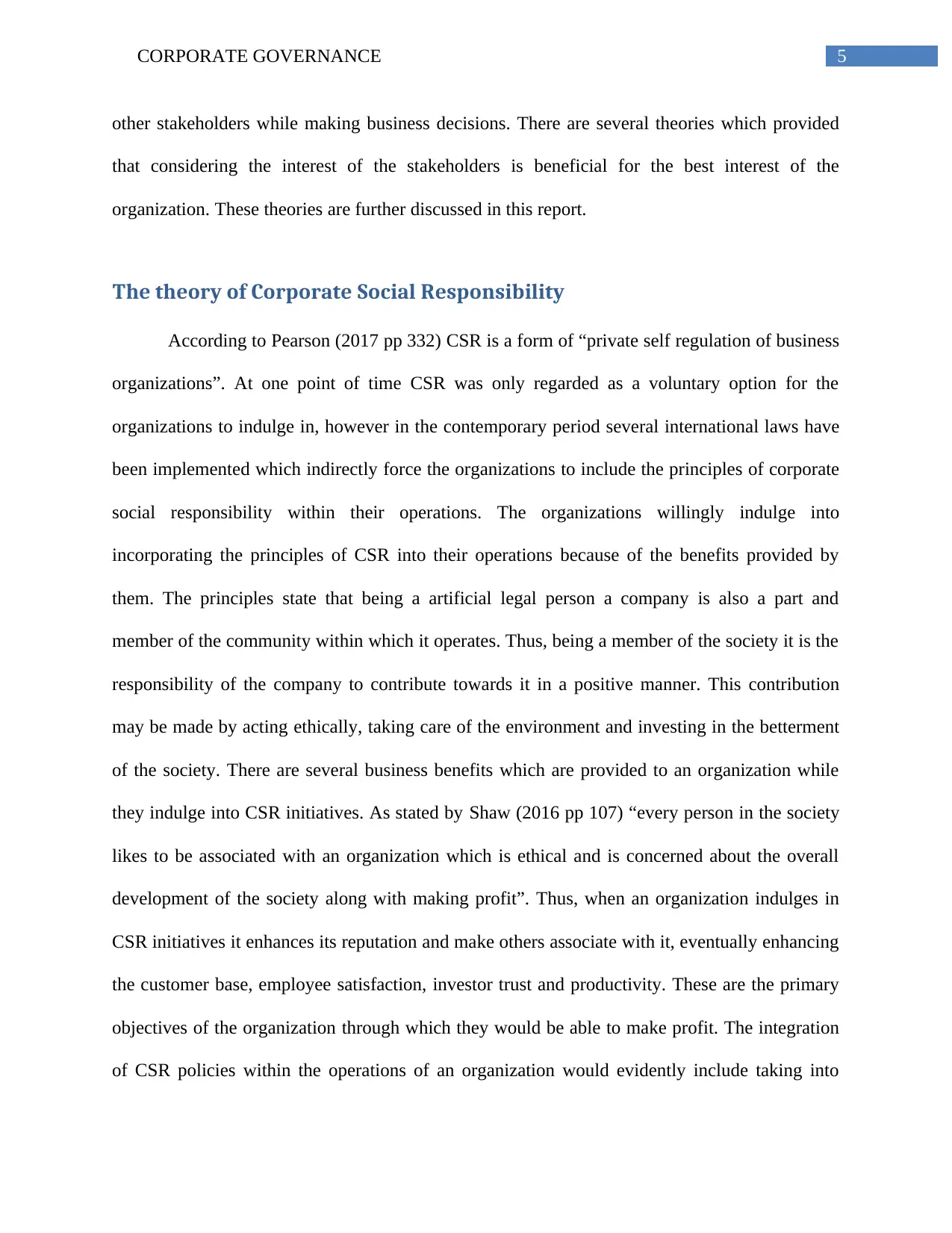
5CORPORATE GOVERNANCE
other stakeholders while making business decisions. There are several theories which provided
that considering the interest of the stakeholders is beneficial for the best interest of the
organization. These theories are further discussed in this report.
The theory of Corporate Social Responsibility
According to Pearson (2017 pp 332) CSR is a form of “private self regulation of business
organizations”. At one point of time CSR was only regarded as a voluntary option for the
organizations to indulge in, however in the contemporary period several international laws have
been implemented which indirectly force the organizations to include the principles of corporate
social responsibility within their operations. The organizations willingly indulge into
incorporating the principles of CSR into their operations because of the benefits provided by
them. The principles state that being a artificial legal person a company is also a part and
member of the community within which it operates. Thus, being a member of the society it is the
responsibility of the company to contribute towards it in a positive manner. This contribution
may be made by acting ethically, taking care of the environment and investing in the betterment
of the society. There are several business benefits which are provided to an organization while
they indulge into CSR initiatives. As stated by Shaw (2016 pp 107) “every person in the society
likes to be associated with an organization which is ethical and is concerned about the overall
development of the society along with making profit”. Thus, when an organization indulges in
CSR initiatives it enhances its reputation and make others associate with it, eventually enhancing
the customer base, employee satisfaction, investor trust and productivity. These are the primary
objectives of the organization through which they would be able to make profit. The integration
of CSR policies within the operations of an organization would evidently include taking into
other stakeholders while making business decisions. There are several theories which provided
that considering the interest of the stakeholders is beneficial for the best interest of the
organization. These theories are further discussed in this report.
The theory of Corporate Social Responsibility
According to Pearson (2017 pp 332) CSR is a form of “private self regulation of business
organizations”. At one point of time CSR was only regarded as a voluntary option for the
organizations to indulge in, however in the contemporary period several international laws have
been implemented which indirectly force the organizations to include the principles of corporate
social responsibility within their operations. The organizations willingly indulge into
incorporating the principles of CSR into their operations because of the benefits provided by
them. The principles state that being a artificial legal person a company is also a part and
member of the community within which it operates. Thus, being a member of the society it is the
responsibility of the company to contribute towards it in a positive manner. This contribution
may be made by acting ethically, taking care of the environment and investing in the betterment
of the society. There are several business benefits which are provided to an organization while
they indulge into CSR initiatives. As stated by Shaw (2016 pp 107) “every person in the society
likes to be associated with an organization which is ethical and is concerned about the overall
development of the society along with making profit”. Thus, when an organization indulges in
CSR initiatives it enhances its reputation and make others associate with it, eventually enhancing
the customer base, employee satisfaction, investor trust and productivity. These are the primary
objectives of the organization through which they would be able to make profit. The integration
of CSR policies within the operations of an organization would evidently include taking into
⊘ This is a preview!⊘
Do you want full access?
Subscribe today to unlock all pages.

Trusted by 1+ million students worldwide
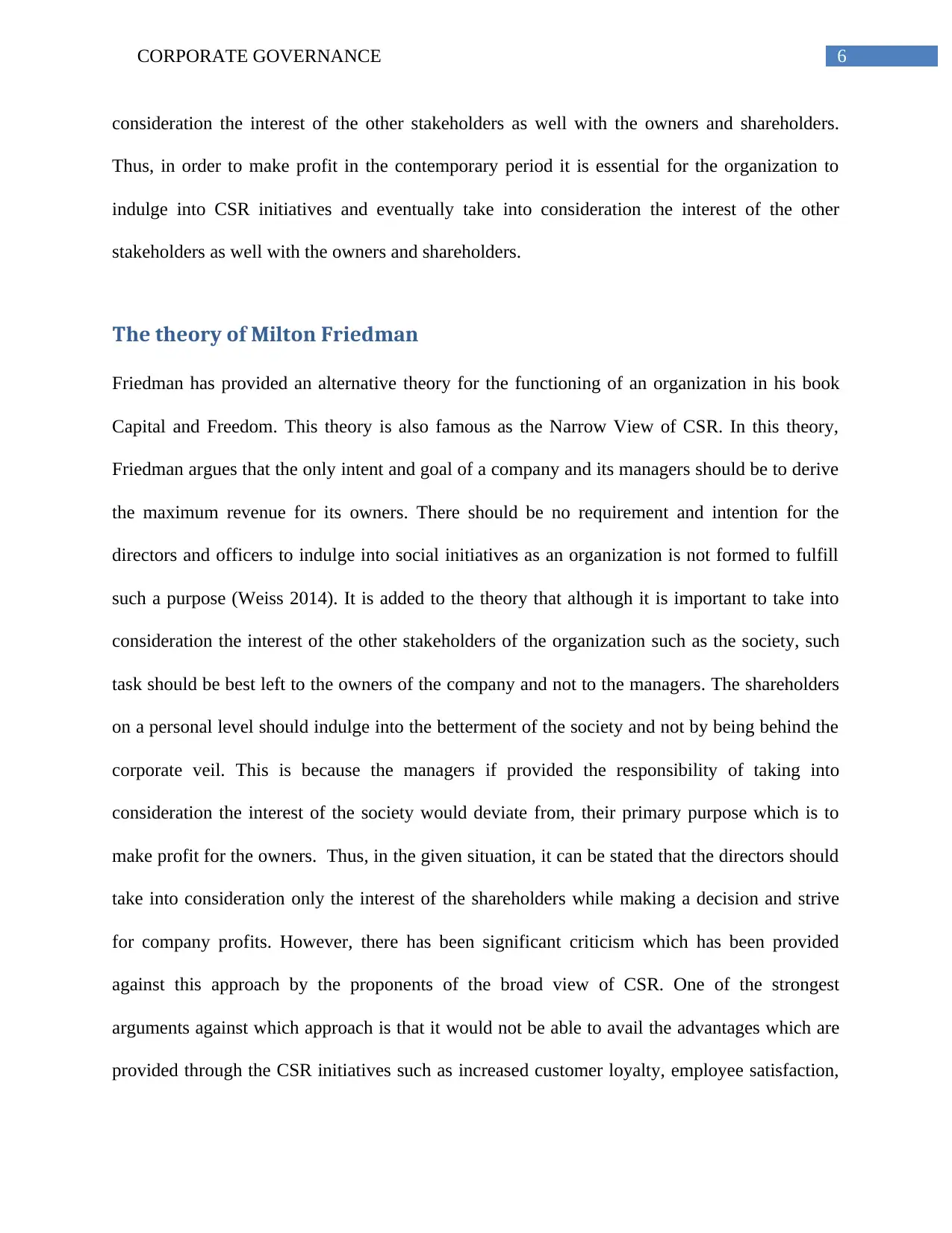
6CORPORATE GOVERNANCE
consideration the interest of the other stakeholders as well with the owners and shareholders.
Thus, in order to make profit in the contemporary period it is essential for the organization to
indulge into CSR initiatives and eventually take into consideration the interest of the other
stakeholders as well with the owners and shareholders.
The theory of Milton Friedman
Friedman has provided an alternative theory for the functioning of an organization in his book
Capital and Freedom. This theory is also famous as the Narrow View of CSR. In this theory,
Friedman argues that the only intent and goal of a company and its managers should be to derive
the maximum revenue for its owners. There should be no requirement and intention for the
directors and officers to indulge into social initiatives as an organization is not formed to fulfill
such a purpose (Weiss 2014). It is added to the theory that although it is important to take into
consideration the interest of the other stakeholders of the organization such as the society, such
task should be best left to the owners of the company and not to the managers. The shareholders
on a personal level should indulge into the betterment of the society and not by being behind the
corporate veil. This is because the managers if provided the responsibility of taking into
consideration the interest of the society would deviate from, their primary purpose which is to
make profit for the owners. Thus, in the given situation, it can be stated that the directors should
take into consideration only the interest of the shareholders while making a decision and strive
for company profits. However, there has been significant criticism which has been provided
against this approach by the proponents of the broad view of CSR. One of the strongest
arguments against which approach is that it would not be able to avail the advantages which are
provided through the CSR initiatives such as increased customer loyalty, employee satisfaction,
consideration the interest of the other stakeholders as well with the owners and shareholders.
Thus, in order to make profit in the contemporary period it is essential for the organization to
indulge into CSR initiatives and eventually take into consideration the interest of the other
stakeholders as well with the owners and shareholders.
The theory of Milton Friedman
Friedman has provided an alternative theory for the functioning of an organization in his book
Capital and Freedom. This theory is also famous as the Narrow View of CSR. In this theory,
Friedman argues that the only intent and goal of a company and its managers should be to derive
the maximum revenue for its owners. There should be no requirement and intention for the
directors and officers to indulge into social initiatives as an organization is not formed to fulfill
such a purpose (Weiss 2014). It is added to the theory that although it is important to take into
consideration the interest of the other stakeholders of the organization such as the society, such
task should be best left to the owners of the company and not to the managers. The shareholders
on a personal level should indulge into the betterment of the society and not by being behind the
corporate veil. This is because the managers if provided the responsibility of taking into
consideration the interest of the society would deviate from, their primary purpose which is to
make profit for the owners. Thus, in the given situation, it can be stated that the directors should
take into consideration only the interest of the shareholders while making a decision and strive
for company profits. However, there has been significant criticism which has been provided
against this approach by the proponents of the broad view of CSR. One of the strongest
arguments against which approach is that it would not be able to avail the advantages which are
provided through the CSR initiatives such as increased customer loyalty, employee satisfaction,
Paraphrase This Document
Need a fresh take? Get an instant paraphrase of this document with our AI Paraphraser
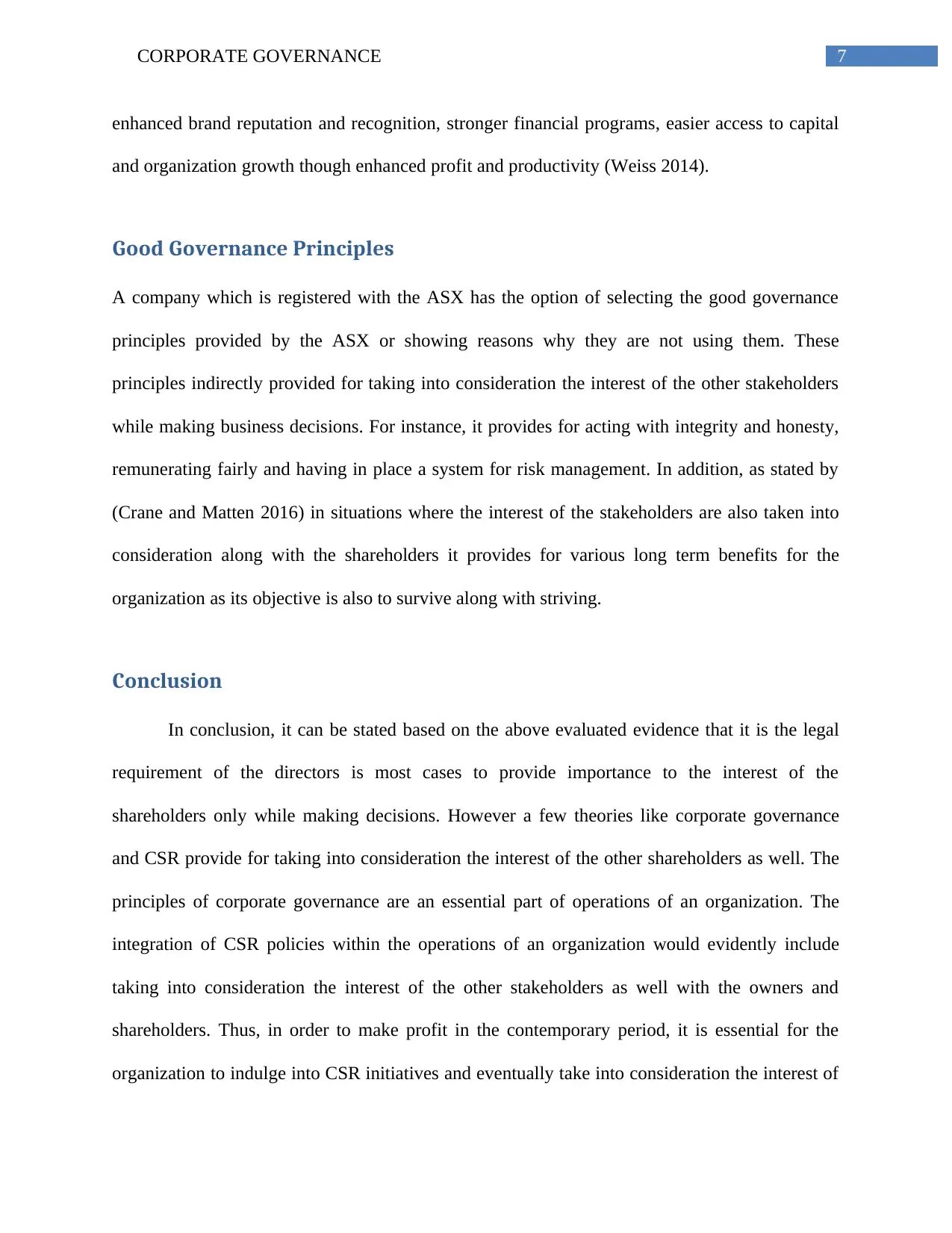
7CORPORATE GOVERNANCE
enhanced brand reputation and recognition, stronger financial programs, easier access to capital
and organization growth though enhanced profit and productivity (Weiss 2014).
Good Governance Principles
A company which is registered with the ASX has the option of selecting the good governance
principles provided by the ASX or showing reasons why they are not using them. These
principles indirectly provided for taking into consideration the interest of the other stakeholders
while making business decisions. For instance, it provides for acting with integrity and honesty,
remunerating fairly and having in place a system for risk management. In addition, as stated by
(Crane and Matten 2016) in situations where the interest of the stakeholders are also taken into
consideration along with the shareholders it provides for various long term benefits for the
organization as its objective is also to survive along with striving.
Conclusion
In conclusion, it can be stated based on the above evaluated evidence that it is the legal
requirement of the directors is most cases to provide importance to the interest of the
shareholders only while making decisions. However a few theories like corporate governance
and CSR provide for taking into consideration the interest of the other shareholders as well. The
principles of corporate governance are an essential part of operations of an organization. The
integration of CSR policies within the operations of an organization would evidently include
taking into consideration the interest of the other stakeholders as well with the owners and
shareholders. Thus, in order to make profit in the contemporary period, it is essential for the
organization to indulge into CSR initiatives and eventually take into consideration the interest of
enhanced brand reputation and recognition, stronger financial programs, easier access to capital
and organization growth though enhanced profit and productivity (Weiss 2014).
Good Governance Principles
A company which is registered with the ASX has the option of selecting the good governance
principles provided by the ASX or showing reasons why they are not using them. These
principles indirectly provided for taking into consideration the interest of the other stakeholders
while making business decisions. For instance, it provides for acting with integrity and honesty,
remunerating fairly and having in place a system for risk management. In addition, as stated by
(Crane and Matten 2016) in situations where the interest of the stakeholders are also taken into
consideration along with the shareholders it provides for various long term benefits for the
organization as its objective is also to survive along with striving.
Conclusion
In conclusion, it can be stated based on the above evaluated evidence that it is the legal
requirement of the directors is most cases to provide importance to the interest of the
shareholders only while making decisions. However a few theories like corporate governance
and CSR provide for taking into consideration the interest of the other shareholders as well. The
principles of corporate governance are an essential part of operations of an organization. The
integration of CSR policies within the operations of an organization would evidently include
taking into consideration the interest of the other stakeholders as well with the owners and
shareholders. Thus, in order to make profit in the contemporary period, it is essential for the
organization to indulge into CSR initiatives and eventually take into consideration the interest of
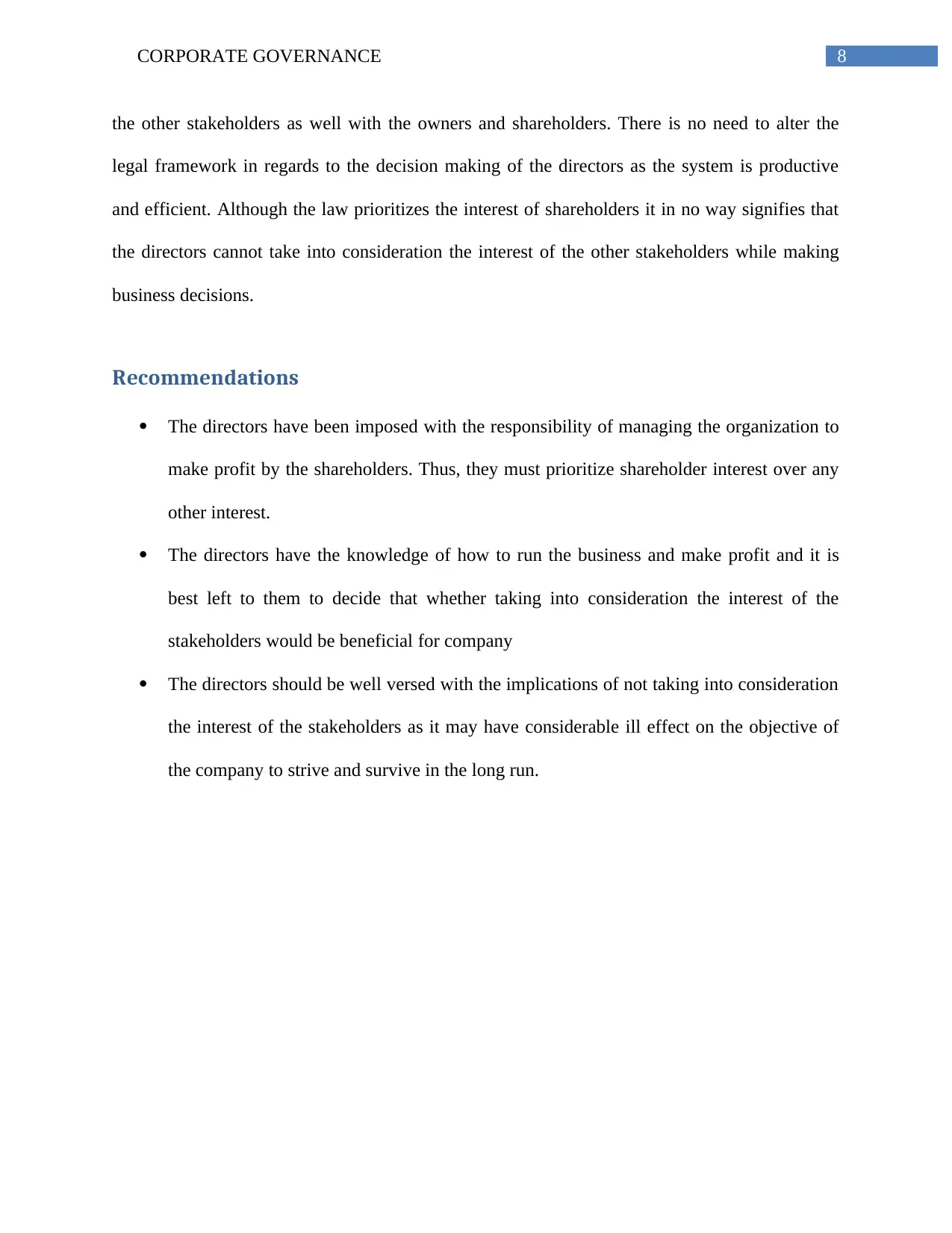
8CORPORATE GOVERNANCE
the other stakeholders as well with the owners and shareholders. There is no need to alter the
legal framework in regards to the decision making of the directors as the system is productive
and efficient. Although the law prioritizes the interest of shareholders it in no way signifies that
the directors cannot take into consideration the interest of the other stakeholders while making
business decisions.
Recommendations
The directors have been imposed with the responsibility of managing the organization to
make profit by the shareholders. Thus, they must prioritize shareholder interest over any
other interest.
The directors have the knowledge of how to run the business and make profit and it is
best left to them to decide that whether taking into consideration the interest of the
stakeholders would be beneficial for company
The directors should be well versed with the implications of not taking into consideration
the interest of the stakeholders as it may have considerable ill effect on the objective of
the company to strive and survive in the long run.
the other stakeholders as well with the owners and shareholders. There is no need to alter the
legal framework in regards to the decision making of the directors as the system is productive
and efficient. Although the law prioritizes the interest of shareholders it in no way signifies that
the directors cannot take into consideration the interest of the other stakeholders while making
business decisions.
Recommendations
The directors have been imposed with the responsibility of managing the organization to
make profit by the shareholders. Thus, they must prioritize shareholder interest over any
other interest.
The directors have the knowledge of how to run the business and make profit and it is
best left to them to decide that whether taking into consideration the interest of the
stakeholders would be beneficial for company
The directors should be well versed with the implications of not taking into consideration
the interest of the stakeholders as it may have considerable ill effect on the objective of
the company to strive and survive in the long run.
⊘ This is a preview!⊘
Do you want full access?
Subscribe today to unlock all pages.

Trusted by 1+ million students worldwide
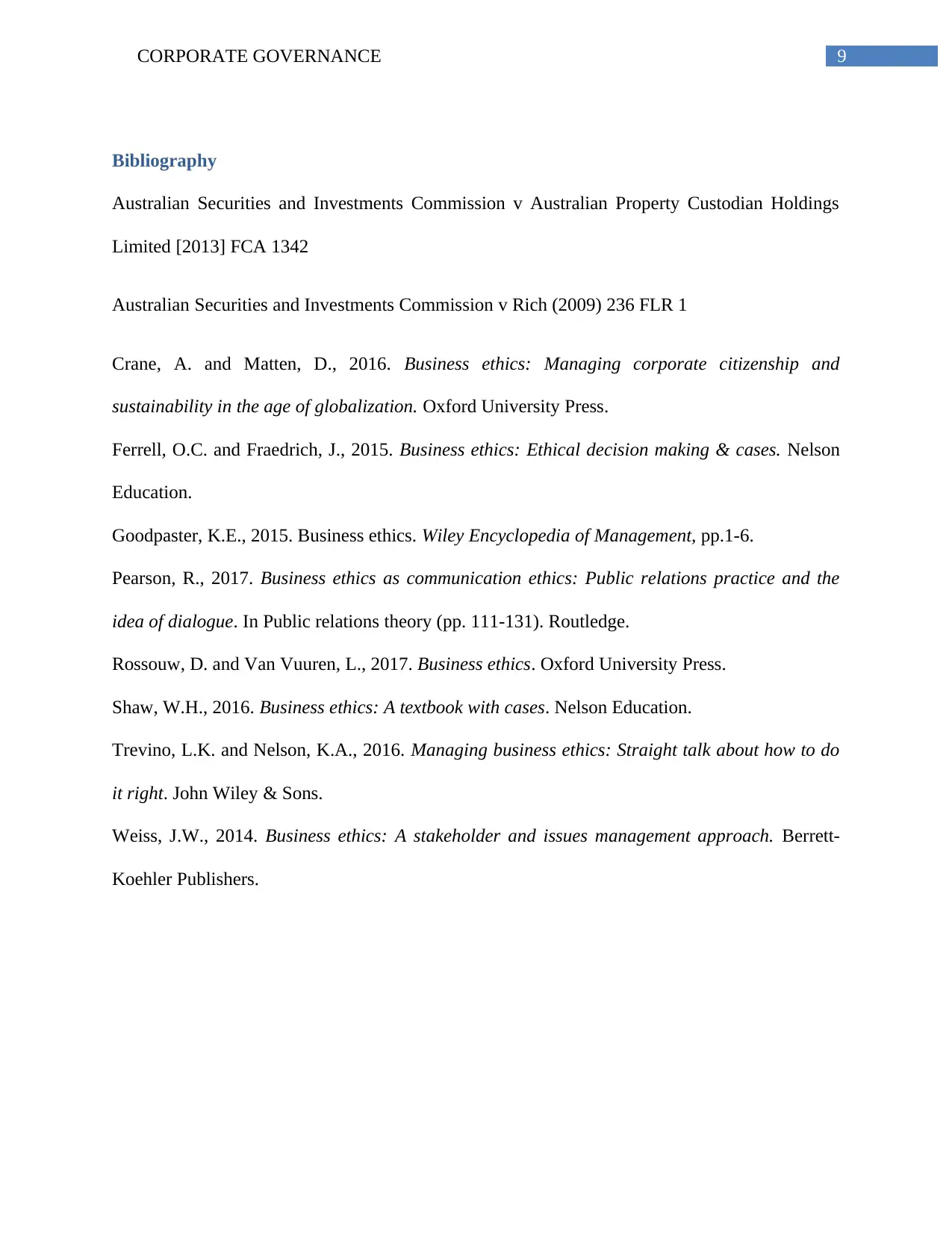
9CORPORATE GOVERNANCE
Bibliography
Australian Securities and Investments Commission v Australian Property Custodian Holdings
Limited [2013] FCA 1342
Australian Securities and Investments Commission v Rich (2009) 236 FLR 1
Crane, A. and Matten, D., 2016. Business ethics: Managing corporate citizenship and
sustainability in the age of globalization. Oxford University Press.
Ferrell, O.C. and Fraedrich, J., 2015. Business ethics: Ethical decision making & cases. Nelson
Education.
Goodpaster, K.E., 2015. Business ethics. Wiley Encyclopedia of Management, pp.1-6.
Pearson, R., 2017. Business ethics as communication ethics: Public relations practice and the
idea of dialogue. In Public relations theory (pp. 111-131). Routledge.
Rossouw, D. and Van Vuuren, L., 2017. Business ethics. Oxford University Press.
Shaw, W.H., 2016. Business ethics: A textbook with cases. Nelson Education.
Trevino, L.K. and Nelson, K.A., 2016. Managing business ethics: Straight talk about how to do
it right. John Wiley & Sons.
Weiss, J.W., 2014. Business ethics: A stakeholder and issues management approach. Berrett-
Koehler Publishers.
Bibliography
Australian Securities and Investments Commission v Australian Property Custodian Holdings
Limited [2013] FCA 1342
Australian Securities and Investments Commission v Rich (2009) 236 FLR 1
Crane, A. and Matten, D., 2016. Business ethics: Managing corporate citizenship and
sustainability in the age of globalization. Oxford University Press.
Ferrell, O.C. and Fraedrich, J., 2015. Business ethics: Ethical decision making & cases. Nelson
Education.
Goodpaster, K.E., 2015. Business ethics. Wiley Encyclopedia of Management, pp.1-6.
Pearson, R., 2017. Business ethics as communication ethics: Public relations practice and the
idea of dialogue. In Public relations theory (pp. 111-131). Routledge.
Rossouw, D. and Van Vuuren, L., 2017. Business ethics. Oxford University Press.
Shaw, W.H., 2016. Business ethics: A textbook with cases. Nelson Education.
Trevino, L.K. and Nelson, K.A., 2016. Managing business ethics: Straight talk about how to do
it right. John Wiley & Sons.
Weiss, J.W., 2014. Business ethics: A stakeholder and issues management approach. Berrett-
Koehler Publishers.
1 out of 10
Related Documents
Your All-in-One AI-Powered Toolkit for Academic Success.
+13062052269
info@desklib.com
Available 24*7 on WhatsApp / Email
![[object Object]](/_next/static/media/star-bottom.7253800d.svg)
Unlock your academic potential
Copyright © 2020–2026 A2Z Services. All Rights Reserved. Developed and managed by ZUCOL.




